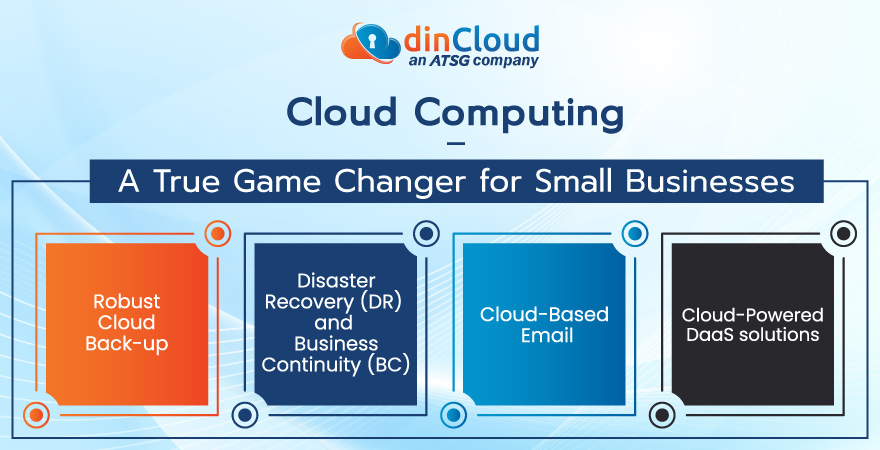The number of new businesses has soared to record highs in the last two years. In 2020 alone, 4.3 million new businesses were created. These new businesses often strike the “product-market fit”, yet they lack the resources and capabilities to take their businesses to the next level. When small businesses are unable to show acceleration in growth, failure is inevitable.
With the latest tools and technologies at their disposal, new businesses should leverage Cloud Computing solutions to bring their products in the market, scale-up rapidly if required, and focus on value maximization for all the stakeholders.
The Chief Information Officer (CIO) and Senior Vice President (SVP) of Altra Federal Credit Union, Josh Hamit, said that Cloud Computing solutions are essential ingredients for the success of businesses’ IT operations.

He further said that it is now out of question whether or not enterprises should adopt Cloud Computing solutions. Instead, it is a matter of which workloads should be prioritized, when it comes to Cloud-based adoptions.
In this post, we will discuss what should small businesses prioritize while shifting their workloads to the Cloud.
1. Robust Cloud Back-up
The security of enterprise data is pivotal for a lot of businesses’ day-to-day operations. If bad actors can lay their hands on enterprise’s sensitive and confidential data, they can hamper their everyday operations, or even threaten to destroy, expose or sell their data.
Brent Ellis, a Senior Analyst at Forrester, said that with on-premise IT environments, enterprises need 24/7/365 availability of IT personnel to monitor and maintain backups. Even little slackness, or misconfiguration can expose their data to vulnerabilities, or increase their attack surface. This makes on-premise solutions in-convenient for small businesses, and it also increases their Operating Expense (OpEx).
Brent further suggested that Cloud-powered Backup-as-a-Service should definitely be prioritized by small businesses, as it is the quickest path to diminish the risks lurking around enterprises in the cyber space.
2. Disaster Recovery (DR) and Business Continuity (BC)
The following scenario will help reiterate the importance of Cloud Computing. Consider a small business that has deployed everything in-house / on-premise. If their office becomes inaccessible, or their operations are disrupted due to a prolonged power outage, flood, a pandemic, or any such calamity, they might be doomed.
Even though a lot of businesses do have Business Continuity (BC) plans, they may still need to physically go to the office to execute those plans, or physically access the associated hardware to continue their operations.
Cloud Computing solutions provide a useful online repository to solve this problem. It allows businesses to access their data, documents, workloads and processes from any location, with an endpoint device having an internet connection.
Cloud-powered services like Desktop-as-a-Service (DaaS) and Cloud Hosted Virtual Desktops ensure that your remote-based workforce can “go about its business” as well as maintain the usual operations from anywhere.
Unfortunately, cyber miscreants have access to such sophisticated technologies that have the potential to disrupt small businesses’ IT infrastructure. They can even go to the extent of wiping out enterprises’ entire digital assets. A resilient Cloud-powered Disaster Recovery (DR) plan is vital to protect enterprises from both natural and man-made disruptions.
Josh Hamit further said that businesses, both big and small, should not undermine the importance of Cloud-based DR and BC plans. They are very important to recover from all types of catastrophic events, and to seamlessly restore
3. Cloud-Based Email
Businesses in general, and small businesses in particular, should definitely consider Cloud-based emails for the following major reasons.
- The employees can easily access Cloud-based emails.
- They can seamlessly be scaled to accommodate a growing workforce.
- With Cloud-based emails, enterprises IT infrastructure will have more room for other operations.
- When CSPs take charge of enterprise’s emails, their IT staff have time to focus on other mission critical tasks and innovative ideas.
- CSPs also provide improved security against phishing emails and pervasive spam messages.
- Multiple Cloud Providers offer robust security features, as a built-in feature of their offering. These features include filtering of spam messages, protection against malware, ransomware and prevention against data loss.
4. Cloud-Powered DaaS solutions
Cloud-powered Desktop-as-a-service (DaaS) solutions and Cloud Virtual Desktop Infrastructures (VDI) are gaining a lot of traction, and can streamline enterprise IT operations. Businesses no longer have to store anything locally, and they can have more control over their resources, within the Cloud Provider’s environment.
Migration to Virtual Machines (VM) is particularly important for small businesses having a remote-based workforce. The reason for this is that they can save significant amount of money on both Capital Expenses (CapEx) and Operating Expenses (OpEx). These expenses generally include rent of the physical office space, hardware cost, and the expenses associated with additional staff members.
Conclusion
A lot of people are unaware of this, but the Cloud has been around for well over a decade now. However, its widespread popularity and rapid adoption is quite a recent occurrence.
When small businesses migrate their mission critical workloads to the Cloud, they set themselves up for bigger wins. Cloud-powered Backups, Disaster Recovery as a Service (DRaaS) plans, Business Continuity (BC) models, Cloud Hosted Desktops and Emails can really help small businesses elevate their status from the competitors. Cloud Computing is a wave of the future, and it looks like the future is here.
If you are a small to mid sized business (SMB) that is looking for reliable Cloud Computing solutions, your wait is over! Feel free to contact dinCloud, an ATSG company, for Desktop-as-a-Service (dinDaaS) and Hosted Virtual Desktop (dinHVD) solutions that are tailored around scalability, agility and productivity for your enterprise.


